#Early railways
Explore tagged Tumblr posts
Text
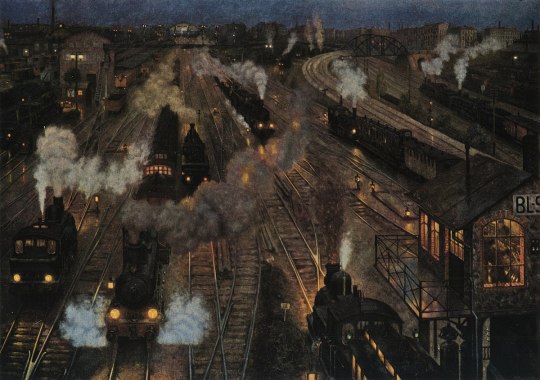
Hans Baluschek (1870-1935)
"City railway station" (1904)
Oil on canvas
#paintings#art#artwork#cityscape painting#trains#hans baluschek#oil on canvas#fine art#german aritst#smoke#smokey#railway#clothes#aesthetic#night#early 1900s#early 20th century#train#1k#2k#3k#4k#5k
8K notes
·
View notes
Text

231 notes
·
View notes
Text

Rain, Steam and Speed , The Great Western Railway - Joseph Mallord William Turner , 1844.
British , 1775-1851
Oil on canvas, 91 x 121.8 cm . 35.8 x 47.9 in.
50 notes
·
View notes
Text

Old postcard of the Kyiv Funicular, Ukraine. Between 1905 and 1917.
#ukrainian history#vintage ukraine#old postcard#railway#kyiv#vintage postcard#funicular#early 20th century#1900s#1910s#black and white#ukraine
81 notes
·
View notes
Note
ok question how and why was the scrapping of sentence vhecials even allowed in the first place I mean sure irl this isn't that bad but in ttte the mass scrapping of steam engines in the 60s in Britain might as well be considered a genocide did Brittish railways use every loophole and excuse in the book to do this and every other country for that matter
Thank you for your ask! And wow does it open up some cans of worms...
But before we get to in-canon reasons for why BR was able to mass-scrap steam engines, we should probably consider the author's intent behind writing this in - after all, the Reverend W. Awdry was writing a children's book series and went "ah yes, I want this to be a picture children see":
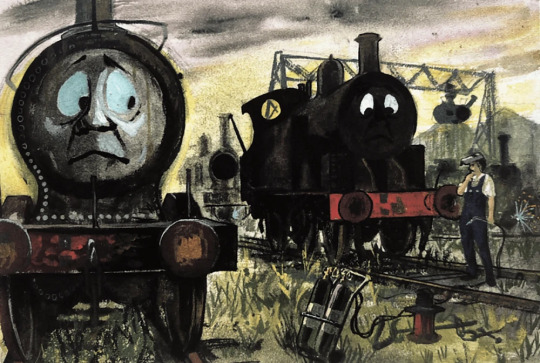
So why does Awdry allow for scrap to happen? Because it happened in real life. Awdry was a massive steam engine fan - he grew up on the Great Western mainline near Box Tunnel listening to engines working up and down the grade, his father was a steam fan, and he himself volunteered on various heritage railways (most notably the Talyllyn in Wales) - this is a man who loves his railways and his steam engines. But in the era he was writing - the 1950s and 1960s - the engines were rapidly withdrawn and scrapped as part of BR's Modernisation Plan. Awdry hated this - Britain was scrapping completely useful engines who had served the country through two global wars for untested, faulty diesels that smelt. If you read through the Forewards from Four Little Engines onwards, you can sometimes find that he is quietly advertising heritage railways by crediting them and telling his audience where the real-live versions of the steam engines in his books are. He does this for the Ravenglass and Eskdale Railway, the Dartmouth Railway, the Ffestiniog Railway and of course: the Talyllyn and Bluebell Railways.
Awdry's books were as much a love letter to steam as they were a series of children's stories, and he wanted to make a real point about how he disagreed with BR and try to promote heritage railways to help keep steam alive.
Rev. W. Awdry was also a notorious perfectionist. Remember, this is a man who said that Dalby's illustrations of Percy looked like "a green caterpillar with red stripes" (ouch!).
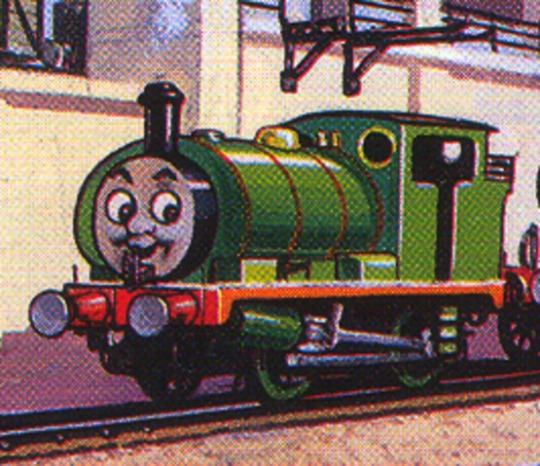
This perfectionism carried over to the books: Awdry is very famous for his views on realism in Thomas - he quite famously disliked the Season 3 episode 'Henry's Forest' because it both broke Rule 55 - which states that engineers need to notify the signalman that their trains are at a stand in order to avoid an accident - and the fact that the trees were too close to the line, which could have caused a fire from sparks from the engine in real life. He placed real railway practice and its constraints at the forefront of his stories, and it shows.
Mixed together, these two parts of Awdry created the situation where he wrote about the scrapping of engines and the existential danger that it posed to steam engines and their livelihoods. This is the authorial reasoning behind scrap and the mass-scrapping of steam engines being so prevalent in his works - and it is prevalent, from as early as the first story where Edward is bullied by the bigger engines for being used so little and the implicit likelihood that he could be withdrawn and cut up.
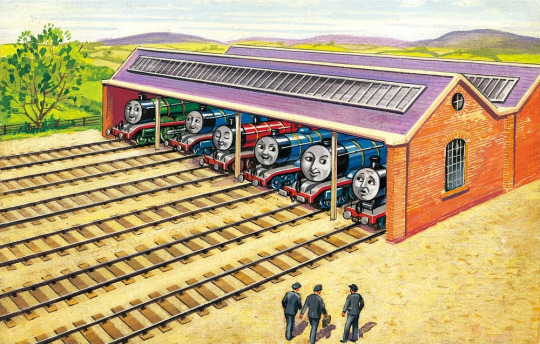
With the authorial reasons for the mass-scrapping of steam engines having been answered, it is now a question of how to drill down into canon and explain what these views and decisions made by Awdry translate into.
Firstly, we need to separate two things: sentience, and human. Vehicles are not people in this series - they are very much the closest thing in terms of intelligence and speech ability, but they are not human. They are built out of minerals pulled from in the ground and powered by more rocks dug up from underground. Whether or not you see this as making this a society that enslaves the engines or not, the reality is that they are machines and the property of their human owners. This is a lot like horses - horses love us, even though we own them, and we often love them back. But not always. Horses were and are, after all, animals used for jobs - in their heyday, they were the car, bus, tram and train of society. We bought and sold them, and when they were no longer useful, people often put them down. Which is extremely morbid, yes - but it's an unfortunately necessary fact of that era and their lives.
Now translate it over to locomotives - the iron horses.
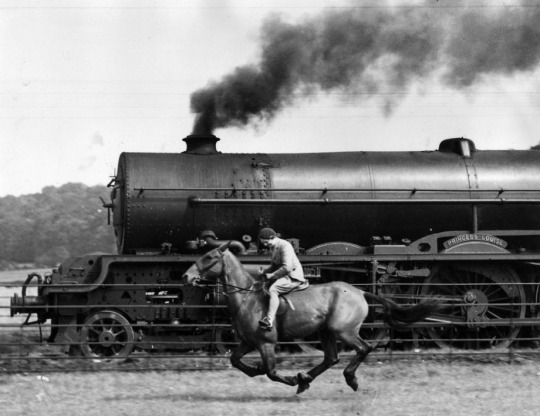
Locomotives are built to serve a purpose, and they must be capable of fulfilling their role. They are taking on the position of the horse from the above analogy - and when they are no longer useful, they can either be sold or scrapped. Worse yet, they are the industrial evolution to the horse - the capitalist's beast of burden.
And now I can finally move to answer the question of why the mass-scrapping of engines was legal: there was never any laws to stop them. From the moment the first engine rolled out of the shop, their owners argued loudly and publicly that they were simply an evolution of the horse. If people didn't give horses rights, why give engines rights? They are not human; they are iron beasts of burden. And in the rigid and very xenophobic society of the Victorian era, this worked incredibly well. Engines were trained using the Railway Rulebook to fulfill their job in much the same way you trained anyone and anything to be good at their job, and their culture was dismissed in the same way that Victorians dismissed any non-European culture.
Now, don't misunderstand me - this is not a good thing. This is a laissez-faire system of caring for vehicle rights developed by capitalism to make it cheaper, easier and less objectionable to discard old stock when needed. The government never intervened because doing so would place all the vehicles under their control under scrutiny. Can't have military lorries and tanks suddenly wondering whether or not their roles in war are legal, after all. And it's that worry that led to no nation really looking into vehicle laws until after World War Two - and even then, it was haphazard at best and downright discriminatory at worst. Even today, there are still no solid laws in place to cover the vast majority of vehicles - only those held in museums owned by the government or 'considered to be of cultural or historic importance' are afforded any rights at all - Thomas, Flying Scotsman, Stephenson's Rocket - those engines.
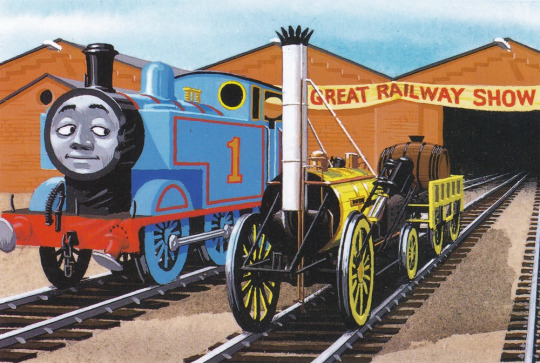
It's not because the engines themselves don't care, but because they simply have no real option to change this. Engines cannot move themselves - the worst they can do is force themselves to break down, and there will almost always be another engine to take their place.
Sorry for how morbid that got, but I hope it helped explain why I think engines were allowed to be mass-scrapped by BR!
#weirdowithaquill#railway series#thomas the tank engine#ask answered#ttte#this gets morbid#tw depressing stuff#tw horse death mentioned indirectly#tw scrap#railways#why was BR able to scrap their steam engines#early-stage capitalism#laissez faire
41 notes
·
View notes
Text

Gordon clanked crossly into Maron Station. The only time he appreciated seeing this station was when he was soaring through it, preferably with the express after cresting the hill people still insisted on naming after him.
“Stupid Henry.” he fumed. “And his stupid overhaul or whatever it was. We all struggled through the twenties. Why should he get special treatment? Because he was always ‘sick’? Peh, so he says.”
A bellowing whistle soon cut through the countryside. Gordon looked up with a glare. Henry came storming through the station, the Wild Nor’ Wester in tow.
“Express coming through!!” He hollered.
“But- but that’s my line!” Gordon shouted.
“Hi, Gordon!” Henry laughed. “Bye, Gordon!”
To call the big blue engine unamused would be a massive understatement.
#ttte#thomas and friends#thomas the tank engine and friends#railway series#rws#ttte henry#ttte gordon#ttte wild nor wester#tbh gordon was pretty toxic in the early books#like imagine belittling someone the day they get back from surgery
22 notes
·
View notes
Text

“IT’S NOT FAIR! I WANT TO PULL COACHES! I WANT TO RUN ON THE MAINLINE! I DESERVE IT! I’M JUST AS IMPORTANT AS YOU!!!”
“THEN WHY DON’T YOU ACT LIKE IT, THOMAS?!”
Reference Used:

#wysty draws#thomas the tank engine#ttte humanized#ttte Thomas#railway authority#POV: Thomas is about to punch you in the face#ah early thomas was such a troublesome lad…#just like a little pink diamond we know#update: slightly edited it cause it was looking too pink
51 notes
·
View notes
Text

The Tsarevich Nicholas (later Nicholas II), with a construction cart, giving the start to the construction of the Trans-Siberian Railway; 1891.
9 notes
·
View notes
Text
bye Germany I'm crying all the way home lol
#no i mean literally 😂#feeling so fucking emotional about everything all of a sudden#in the escalator at a german railway station as well lmaoooooo#i don't know what happened i was just suddenly feeling all the feels all at once#maybe i'll stop crying sometime early april i'll keep you updated ✌️#edit. not crying in the escalator anymore btw lol but on public transportation 🤡
12 notes
·
View notes
Text
Eighteen-Forties Friday: The Railway Dragon

An illustration by George Cruikshank in The Table Book, 1845 (The British Museum). The commentary in Richard A. Vogler's book Graphic Works of George Cruikshank adds that the accompanying text signed by Angus B. Reach and titled "The Natural History of the Panic" details "the way this monster has destroyed Englishmen by gobbling up their money."
Conveniently, another book from 1845 addresses the crises driven by financial speculation in railroads: The Railway Panic: Hints to Railroad Speculators, Together with the Influence Railroads Will Have Upon Society, Together with the Laws on the Subject, by Henry Wilson (Google Books). Although Wilson denounces "modern schemers" and speculation, he's very pro-railroad, and he even thinks that railway travel will break down class barriers:
In former times, each class of persons had their modes of travelling. There was for the rich, the post chaise; for the country gentleman, the mail; for the tradesman, the stage coach; and for the poor, the waggon; a man's respectability was established by the mode in which he travelled. The difference between railway and stage coach travelling is nearly all the difference between civilization and barbarism. The railways will, ultimately, reverse the picture; and the rich will be brought in contact and converse with the poor, sympathies are engendered between the various classes, and the manners of the higher class descend to the lower.
Karl Marx evidently thought something similar in 1848, according to William Scheuerman in The Stanford Encyclopedia of Philosophy (Spring 2023 Edition): "Despite their ills as instruments of capitalist exploitation, Marx argued, new technologies that increased possibilities for human interaction across borders ultimately represented a progressive force in history."
It was Scheuerman's article on globalization that made me reflect on "the compression of territoriality," as he puts it, with new modes of travel making the world seem more accessible and smaller in the 1840s.
Writing in 1839, an English journalist commented on the implications of rail travel by anxiously postulating that as distance was “annihilated, the surface of our country would, as it were, shrivel in size until it became not much bigger than one immense city” (Harvey 1996, 242). A few years later, Heinrich Heine, the émigré German-Jewish poet, captured this same experience when he noted: “space is killed by the railways. I feel as if the mountains and forests of all countries were advancing on Paris. Even now, I can smell the German linden trees; the North Sea’s breakers are rolling against my door” (Schivelbusch 1978, 34)
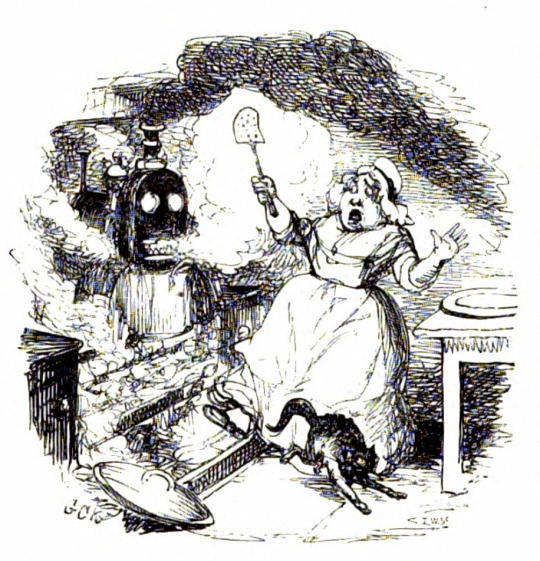
Or maybe just a train monster in your kitchen
#Eighteen-Forties Friday#1840s#railways#railroads#age of steam#early victorian era#victorian#karl marx#george cruikshank#the railway panic#globalization#'in former times each class of persons had their modes of travelling'...imagine going backwards from 1845
68 notes
·
View notes
Text
Very specific efteling joke you'll only get if u know anything abt the locomotives

#real steam locomotive#real steam engines#real railway#efteling moortje#efteling aagje#efteling trijntje#efteling neefje#efteling#pokemon elite 4#for the people confused#trijntje is the youngest steam loco at wfteling being built in 1991#while the others are all early 1900s locomotives
12 notes
·
View notes
Text

10.2015 Hamburg
32 notes
·
View notes
Text
A Very North Western Christmas
Dear Friends, The holiday season is always a very busy time on the railway. “We’re rushed off our wheels, and hardly ever get a rest” Henry told me. “But we have a duty to look after our passengers and our friends,” added Edward. “Yes Indeed” put in Gordon, “It’s most important that everything runs to time”. “But once all’s said and done, the Christmas Party at the sheds is always something to look forward to” peeped Thomas. I asked them all if there was any Christmas which they remembered more than others, and they told me of one from back when Thomas was still the Big Station’s pilot. A most chaotic Christmas, with packed trains, missing Christmas trees, and… Oh, but you must read the story for yourself. The Author
Oh boy, this was a long one, but I managed to get it done just in time.
I hope you enjoy my Christmas fic for this year.
Honestly this kinda ended up being something like 2 or 3 stories in one. But part of what I always liked about the Christmas specials in ttte is how they made a point to include as many characters as they could, even if it was just an appearance in the background, so I wanted to try and do something similar.
Merry Christmas, Happy Holidays, and a Happy New Year.
#ttte#rws#thomas and friends#thomas the tank engine#the railway series#ttte thomas#ttte edward#ttte henry#ttte gordon#ttte sir topham hatt#ttte 98462#ttte glynn#original characters#christmas#early nwr#old shape henry#thomas is still the station pilot#this takes place in december 1924#thomas just wants everyone to be happy for the holidays
19 notes
·
View notes
Text
Train stations in the rain >>>>
#especially when it's early in the morning or around sunset and it's overcast#train posting#railway#panda's post
2 notes
·
View notes
Text

Mariupol Railway Station, Ukraine circa 1890s-early 1900s.
#ukrainian history#vintage ukraine#railway station#black and white#1890s#1900s#late 19th century#early 20th century#mariupol#ukraine#train station
57 notes
·
View notes
Note
If you had to add one fan OC to the NWR, who would it be? (Only caveat is that it cannot be a copy of a pre-existing RWS character. This includes Scott.)
This is a tough question! I'm going to guess that I can't include Andrew in this answer (cause that's way too biased), so I'll run on with that in mind. Cause if he was included, it'd be him. He's my OC, and therefore would be my instant pick - and that kind of negates the entire question. Sorry Andrew, maybe next time!

I'm also going to avoid picking Alfred the B12, mostly cause he's one of those characters who has practically melded his way into the series already as 98462.
Ok, so I think a preface to my answer is to note that I grew up on the very early years of the Thomas fandom on YouTube - we're talking 2011 and 2012 (to give you an idea of what was going on around this time, it's only about 2 years after Alfred the B12 was introduced). This era was very much coloured by a hatred of the HiT era, SiF was still the dominant place to find Thomas content, and many of the cornerstones of the Thomas fandom on YouTube were just starting out. And I was not on SiF much at this point (I was a kid back then, and YouTube was easy to find and use) - so I grew up on EE93, WildNorWester and DieselD199.
With this in mind, I would have to pick Alice.

Alice is a WildNorWester OC from their series 'Sodor the Early Years' (link to her debut episode here) and perhaps one of my favourite early era OCs. Then again, it's hard to decide when it comes to WildNorWester simply because they created several of the most notable and well-remembered fan engines - Peter, Eric, Iris, Lily, Adam, Colin and Patrick all originated with WildNorWester, not to mention Andreas and Atlas. And most of them have had up to 10 years to bed into the fandom. EE93's Young Tucker is another good contender, though they're a bit more obscure.
I recommend all three YouTubers and their series'. The quality may not be exactly the greatest anymore, but wow are they incredible to watch!
#weirdowithaquill#thomas the tank engine#ask answered#ttte#wildnorwester#ee93#dieseld199#talking about other peoples' OCs#This is less a sign of my age and more a sign of when I entered the fandom#railway series#Sodor the Early Years#youtube link
11 notes
·
View notes